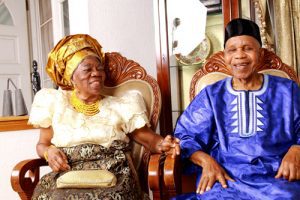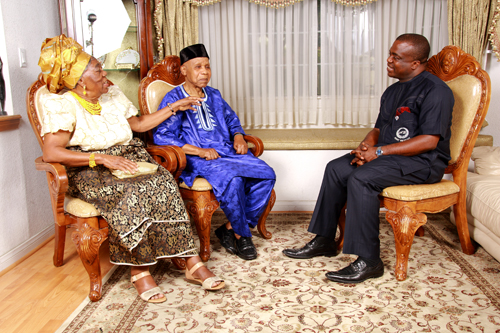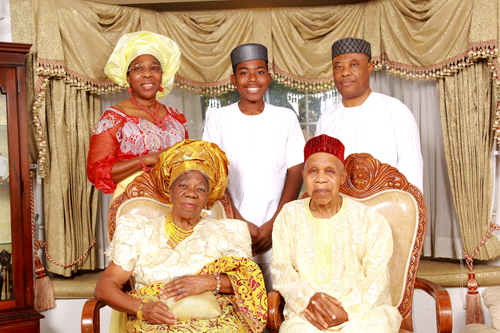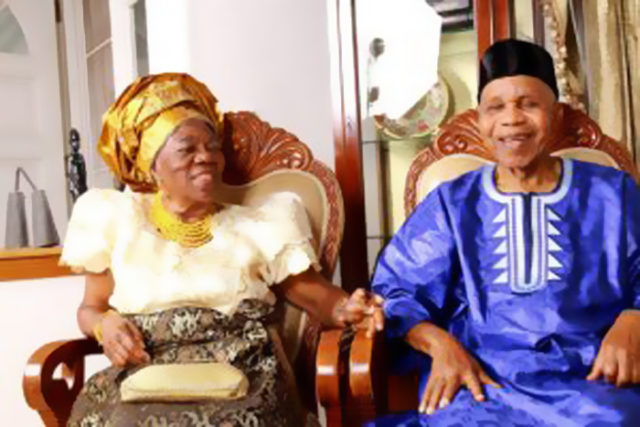 Chief Edward Osuchukwu Ihejirika was born on 1st Sept, 1926 in Alaike, Ikenanzizi, Obowu, Okigwe Division of Owerri Province Eastern Nigeria. Alike- Ikenanzizi is in present day Obowu Local Government Area of Imo State, Nigeria.
Chief Edward Osuchukwu Ihejirika was born on 1st Sept, 1926 in Alaike, Ikenanzizi, Obowu, Okigwe Division of Owerri Province Eastern Nigeria. Alike- Ikenanzizi is in present day Obowu Local Government Area of Imo State, Nigeria.
Young Edward attended: St. Enda Catholic School, Ikenanzizi from 1930-1937.
St. Joseph’s Catholic School, Kaduna from 1937-1942 obtaining his first school leaving certificate there in 1942. He proceeded to St. Thomas’s College, Igbuzor from 1943-1946 obtaining his Teachers’ Higher Elementary Certificate in 1946.
He also obtained his Teachers’ Senior Certificate in 1948 and a Bachelor of Arts degree in the 2nd Class Honors in History from the University of London in 1952. His degree from the University of London was obtained as a correspondent student in the University of London.
Chief Ihejirika was variously Headmaster St. Joseph’s School Kaduna 1947-1948 a position he held at the age of 21 becoming the youngest Nigerian school headmaster in colonial Nigeria. He was also headmaster at St. Teresa’s School, Ikenanzizi from 1949-1950. He also taught in New Bethel College, Onitsha from 1951- 1952
and Government College, Ughelli from 1952-1956. Some of his students at Government College, Ughelli were Retired General David Ejoor, his Godson in Baptism and former Governor of the Mid-West, Mr. Sam Amuka-Pemu, Publisher of Vanguard Newspapers, Peter Enahoro (Peter Pan) among many others.
He then went on to become a Provincial Education Officer in several locations including – Ikeja, Lagos, Akure, Warri and Benin from 1956-1973. From 1973 to 1977 he was Chief Inspector and Director of Education Midwestern, Nigeria from where he retired in 1977.
Since his meritorious retirement, Chief Ihejirika has been living in Benin City where he runs a successful agricultural business.
Chief Ihejirika met his wife Eunice in 1948 and they were married in 1950. Their marriage of 66 years have been blessed with eight children:
Dr. Adaugo Okorocha
Dr. Arthur Ihejirika (Late)
Engr. Chima Ihejirika
Dr. Ivy-Joan Madu
Arc. Edward Ihejirika
Attorney Fred Akala Ihejirika
Mr. Caesar Nachi Ihejirika
Mr. David Izu Ihejirika
several inlaws and grandchildren.
In this interview with our Publisher – Hon. Chike Nweke, Chief Ihejirika and his wife talk about their lives, their career, raising up their eight successful children, the secrets behind their long marriage and their hopes and dreams for Nigeria.
 To: CHIEF EDWARD OSUCHUKWU IHEJIRIKA
To: CHIEF EDWARD OSUCHUKWU IHEJIRIKA
Please tell us a little bit about your early background and your growing up years?
My parents Fred and Mary, both of whom were literate in Igbo and partly English, put my sister Elizabeth and me to school very early. For me schooling was very tedious and long and included three years of Infant school before I got admitted into elementary school stage which was unending, but had to end! Then, each year anyone failed the promotion examination he or she repeated the class and kept repeating it. For how long? Nobody would say, so the option was to work hard and never fall into that category.
Furthermore, because of the constant flogging we were receiving from the teachers, especially as boys, schooling was indeed scary. It was parental pressure that kept me at school or I would have run away like some of my classmates. Teachers were thus one of my earliest antipathies and if I later on became a teacher, it was as my cross to carry for want of a better career. My supposed cleverness pointed in no other direction.
Only a few children went to school in those days and the school environment was very hostile; and in spite of my change of school in 1937 from St. Enda’s Catholic School, Ikenanzizi, to St. Joseph Catholic School, Kaduna, the whipping continued.
You were educated in Eastern, Northern, Midwestern and Western Nigeria, what significant experiences did you have during your school years and how did education in these different environments shape your world view?
The different backgrounds gave me all the knocks I needed for early maturity and I was ready not only to go around Nigeria, but into the world. I became accustomed to working even in alien environment where perhaps I knew nobody as was once the case in Germany. I picked up no significant prejudices because basically all people are the same. On the other hand, because of the adjustments I was obliged to make to accommodate changes in local environment, my moves cost me some of the joys of childhood and the company of my parents. I wept on occasions.
You were reported to have been the youngest headmaster of a school in colonial Nigeria when at age 21 you became headmaster at St. Joseph’s School Kaduna (1947-1948).What challenges did you face on taking such a leadership position so early in life?
All the teachers under me were older than I was and most of them had taught me in the same school before I went to college. I could not be bossy with my eyes open, I had to learn to maneuver and give them the respect due them as my former teachers. I never had any confrontation with any of them, not even Eugene Oragui. I had a very painful and unforgettable experience with Mr. Oragui. When I transferred mid-year in 1937 from St Enda’s School Ikenanzizi to St Joseph’s Catholic Kaduna, I arrived with my transfer certificate to continue in Standard 2, the headmaster instructed Mr. Oragui to admit me into Standard 2, but he refused. He told the headmaster that I was too young for his class. I had to be sent to repeat Standard 1 which I had already completed and passed in 1936. It was devastating for me. Additionally, some of the senior school boys were my own age, or older, and disciplining them was not easy, but we managed.
My differences were with the Irish School Manager, Rev. Fr. Green. He denied me enough professional room in which to operate. We quarreled, and I was on the move.
Please tell us about the different positions you held in different parts of Nigeriaas one of Nigeria’s foremost educationists before you became Chief Inspector and Directorof Education Midwestern Nigeria?
My next move was back home as Headmaster of St. Teresa’s Catholic School (Formerly St. Enda’s) Ikenanzizi for two years from 1949 to 1950, at the end of which year I married. We then moved. Our moves were to become exceptional and it took us to Onitsha where I taught at New Bethel College from 1951 to 1952. Upon my graduation with a B.A. degree (Second Class Honors in History) of London University in June that year, I was forthwith recruited as Education Officer into the British Colonial Civil Service in Nigeria on October 9, 1952. My initial posting was to Government College, Ughelli, where I taught English language, History and Latin from 1952 to 1956.
I then had my first field posting as Provincial Education Officer, first to Akure, Ondo Province, where I succeeded Mr. S. O. Sangowawo who was retiring from service; and I was there from 1956 to 1957 when I moved on to Ikeja, Colony Province to replace Mr. P.N.C. Molokwu who also was going on retirement. My stay in Colony Province from 1957 to 1959 was very stormy owing to the work I did on impoverished schools. My predecessors, White and Black, had done nothing. I got some of the worst ones totally rebuilt! And then in 1959 I had taken charge of the registration of voters and virtually had to run!
I had taken on too many challenges and some called me a mad man and after cooling my feet for a few months at the Ministry of Education Headquarters in Ibadan as the Officer-in-Charge of Educational Publications, I was back to Provincial work. I was transferred to Benin-City in 1960, Ondo and Warri in 1961, and then back to Benin-City. It was a lot of going around and it was probably punitive and in fact Edith my eldest daughter who was at school in Ondo wanted to remain there and in 1961 refused to move with the rest of the family to Warri until I pleaded with her. I received a double promotion in 1961, but no matter, I felt that my years in the public service were wasted and I knew it, and I began to plan for early retirement.
My transfer to Benin-City in 1961 proved to be permanent. It became the capital of the new Midwestern Region in 1963. Mr. S. F. Edgal and I were the most senior officers and I was ready to concede to him as native son in the running for the office of Chief Inspector of Education, but Premier Osadebey and his henchmen refused to look at either of us and he took the unusual step of hiring Mr. C.M. Ebert, a retiree in his own country, all the way from Australia as the first Chief Inspector of Education. Mr. Ebert was unhappy about the situation and was ardent that I should succeed him. I was sent away to Australia for three months for this purpose, but with the on-rush of the Nigerian/Biafra Civil War soon after my return, I could not stay back in Benin-City waiting for a promotion! And here is another angle to it. Long after Mr. Ebert had gone back to his country, the office of the Chief Inspector remained vacant throughout the civil war and it was precisely a day after my return to Benin-City that Mr. Edgal was promoted Chief Inspector! I felt sorry for him for waiting so long. He never supervised my work or gave me an assignment, not even once.
From 1974-1977 you were Chief Inspector and Director of Education Midwestern Nigeria.
How did you achieve this great feat so soon after the Nigerian/Biafran war? Did you experience resistance in the performance of your duties in this position?
I was an innovator, known to educationists all over Nigeria and after the Civil War, I was immediately resettled in office unlike many other Igbos, and when the Military Governor, Colonel S. O. Ogbemudia personally discovered the level of my talent, he threw in my way all the educational challenges he could think of, and we began to collaborate and it made Benin-City the hub of visiting educationist from all over.
The highlight was when Dr. Ukpabi Asika, the Administrator of East Central State, sent Dr. Adiele, his Commissioner of Education to Benin-City to request that I be released for Special Duties for six months in Enugu to help him re-engineer his Ministry of Education. In return, the Administrator would send to the Governor a good number of University lecturers for his new University, the University of Benin. Dr. Adiele met me in my office and I was willing, but Governor Ogbemudia and his Commissioner of Education, Chief Edwin Clark, refused the exchange.
{By the way, I was on the recruitment tour to London for the first Rector of the University of Benin, Professor Hill, in 1971 and we were very well received at the prestigious Actenum Club. It shows the collaboration I am talking about between Governor Ogbemudia and me, a collaboration that continued in the reign of his successor late General George Agbazika Innih who became my very close friend for the rest of his life. Unfortunately, the Permanent Secretaries hated me but could not come close to the work I was doing.}
When I retired from the public service in 1977 prematurely for personal reasons, not one but six Directors were appointed to replace me. Was I being flattered or was there another angle to it?
 You were reputed to have crafted the policy for the 6-3-3-4 educational system in Nigeria as Chief Inspector of Education in Mid-Western Nigeria.What led you to this policy formulation and do you think that the policy has been well implemented to date?
You were reputed to have crafted the policy for the 6-3-3-4 educational system in Nigeria as Chief Inspector of Education in Mid-Western Nigeria.What led you to this policy formulation and do you think that the policy has been well implemented to date?
I was not yet a Chief Inspector when I was appointed a member of the Simeon Adebo Education Committee which was set up by the Federal Military Government of General Gowon in 1973 to review the education system and bring it up to date. My opposition to the British Colonial system of education was well known. I suffered from it and was always carping at it, unlike many of my educational colleagues who accepted it with docility. We were at a preliminary evening meeting at the then University of Ife where, as the first to speak, with Chief Adebo presiding, I made a long speech in favor of an education that was rooted in our potentials as Africans and not based on second-hand information from foreign sources, which we are unable to handle and assimilate. I spoke for education from the ground up that was there at our finger-tips and was therefore creative and reflected our local conditions as all basic education should be. I also urged that we should abandon the rote learning of the old colonial system which was barren and time-wasting and delayed early intellectual development which is critical to the rest of life. Of late developers, only a few succeed, I pointed out. My speech was applauded and every other speaker agreed with me. That was the apparent take-off of the 6-3-3-4 education system, at least philosophically.
Chief Adebo was very pleased and he came in at this point and asked me what name I would recommend for the new system. As I already mentioned this in the course of my speech, I said we could call it the 6-3-3-4 education system until a better name be found, if necessary.
The report that eventually came out after several other meetings were resumed in Lagos greatly disappointed me as if nobody really understood me. My original ideas were missing from the report. Add to this, the new system was not implemented until after I had retired from the public service and as I was never again consulted, I had absolutely no way of influencing the outcome. The new system may therefore not have given us our full potential in education.
To Mrs. Eunice O. Ihejirika
How did you meet your husband and when did you get married?
A kinsman and a family friend Herbert Okonkwo, told me that a certain Headmaster from Northern Nigeria was looking for a wife; and he asked me if I was interested. Knowing that most Headmasters were middle-aged or older, I demurred and did not give Herbert a positive answer. Why should he be interested in me, an old Headmaster who should have been married long ago? This was what I said to myself. To Herbert, I said “well, until I see him!”
Weeks later on a Saturday while I was a teacher at Catholic Girls’ School, Itu-Ezinihite, Mbaise; Herbert came in company of a lady and three gentlemen and the youngest of the group was the Headmaster in question, and handsome! I was blown off my feet and two years later, on November 26, 1950, we were married.
You have been married for 66 years and have been blessed with eight children,several in-laws, grandchildren and one great-grandchild. Please tell us a little bit about your children and the secret of your very long and happy marriage.
We maintained an open house until old age and all visitors were welcome including off course relatives, in-laws and friends. We did not send out invitations, the visitors came as they needed us. I was a sort of “universal hostess” and during the civil war our home swarmed with refugees and the needy. I headed a large voluntary organization – The Women’s Voluntary Service – that organized and delivered food, medicine and clothes to war displaced people, the aged and the poor. Through this our children learnt service to others and the community. After the civil war my husband and I helped many Igbos returning back to Benin-City and with our contacts we helped them to resettle among the Binis.
All this helped our children also because as they grew up and traveled out, they received help when they mentioned our name. As we were busy with ourselves we were also busy with others even with total strangers. That is the secret of our success.
Please tell us your experiences of raising your very successful children. Did you have to stay home to raise them?
We succeeded with our children because we invested heavily in them. This boosted their confidence and left them in no doubt about our commitment to their welfare. Even when I was in England for three years, my husband took care of my daughter Ivy who he home-schooled and he took care of the other three children.
We loved them equally and although we paid more attention to younger ones, we were even-handed in dealing with them and showed no partiality as between boys and girls for example.
I resigned from teaching as soon as I married to give my full attention to work within the family and I have been busy ever since even today as I went from mother, to grandmother and to great-grandmother.
Having served Nigeria in the colonial era and post-independence, do you recognize the Nigeria you see today? What are your hopes and dreams for Nigeria?
In fact, I have lived through three distinct lives in one, thanks to a long life. The Colonial era was peaceful. There was no politics, no sudden wealth to make anyone go crazy, and public workers were dedicated and fully employed and there were no local issues to distract them because in most cases they worked far away from home. The post-independence era and the haggling for positions brought riff-raffs than normal into the system of governance, and a rogue won his election sooner than an honest man. It made Nigeria unfit for democracy and made democracy itself a tall order for most Nigerians.
The post-civil war (or post-military) era in which we now live, is beyond description. It turned the country’s legislatures into a huge dump, a very mighty dump, into which the country’s fortunes are shoveled perennially to points of no return. Call it a graveyard, and we are talking about the same thing. There is waste but no growth. We talk but don’t know what to do.
What advice will you give to young couples about staying happy in marriage and raising successful children?
To be happy, the couple must be friends and playmates from the very beginning. Friendship lasts longer than romance. Disagreements are inevitable, but never bring outsiders, not even your own parents into your quarrels. And never quarrel in the presence of your children or you will pay dearly for it years later. Your children succeed as much as you want them to succeed by your own efforts. Never discourage a child. If you have no money, pray for him. Don’t steal. It does him or her no good. A thieving father is hard to swallow. I know some childless marriages, childless but unintended, that have been very happy.








Congrats to this amazing couple!